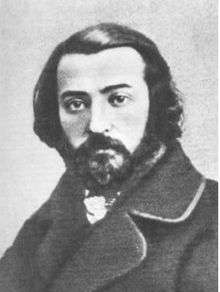Pavel Rybnikov
Pavel Nikolayevich Rybnikov (Павел Николаевич Рыбников, 6 December 1831, Moscow, Russian Empire, – 29 November 1885, Kalisz, Poland, then part of the Russian Empire) was a Russian ethnographer, folklorist and literary historian, credited with the discovery of the previously unknown culture of bylina and epos poetry of the Olonets and Arkhangelsk regions of North-European Russia.[1] He spent the second half of his like in Kalisz, where he was the vice-governor of the Kalisz Guberniya, and where he contributed to the development of local science and culture.
Pavel Nikolayevich Rybnikov | |
|---|---|
 | |
| Born | Павел Николаевич Рыбников 6 December 1831 |
| Died | 29 November 1885 (aged 53) |
| Occupation | ethnographer, folklorist, historian |
| Awards | The Demidov Prize (1864) |
Biography
Pavel Nikolayevich Rybnikov was born in Moscow to a family of staroobryadtsy merchants. After graduating the 3rd Moscow Gymnasium with a silver medal in 1850, he enrolled into the Moscow University's History and Philology faculty. It was at that time that he got close to the Moscow Slavophiles' circle, notably Aleksey Khomyakov and Konstantin Aksakov.[2]
In 1859, arrested in Chernigov for contacts with the local Old Believers community (where he went to study the local history and literature, on Khomyakov's recommendation), Rybnikov was pronounced "a revolutionary" (the fact scathingly commented upon by Alexander Hertzen in Kolokol) and deported to Petrozavodsk. There he started the extensive study of the Northern Russia's folklore, culture and history.[1]
The Songs Collected by P.N.Rybnikov, published in 4 volumes in 1861—1867 made him a well-known author both in Russia and abroad. Two major awards - the Russian Geographical Society's Gold medal and the Demidov Prize, both in 1864, - prompted the Russian authorities to 'pardon' Rybnikov. Relieved of the status of an 'exile' and granted the permission to move to either of Russia's major cities, what he did instead was marry a Polish lady and settle in the city of Kalisz to spend there the rest of his life.[1][2]
After the recreation of the Kalisz Guberniya in 1857 he was appointed to the position of vice-governor of the Guberniya. He supported the creation of the regional newspaper, Kaliszanin, and was its censor for sixteen years.[3] Despite being a Russian official administering a territory in a Russian partition, he is remembered in Poland as especially friendly towards the Polish people and Polish culture.[4][5]
References
- "Rybnikov, Pavel Nikolayevich". The Brokhaus & Efron. The Great Biographical Dictionary. 1907. Retrieved 2015-01-13.
- Pavel Nikolayevich Rybnikov. The Biography. – Kenozerje (the regional Northern site).
- "Najwybitniejsi przedstawiciele". www.kalisz.pl.
- "Urząd Miejski w Kaliszu". um.kalisz.pl. Archived from the original on 2015-05-19. Retrieved 2015-05-19.
- "Życie Kalisza - tygodnik regionalny; Kalisz, Wielkopolska". zyciekalisza.pl.
Further reading
- (in Polish) Gubernator i wicegubernator w Królestwie Polskim po 1867 roku, [in:] A. Górak, J. Kozłowski, K. Latawiec, Słownik biograficzny gubernatorów i wicegubernatorów w Królestwie Polskim (1867–1918), Lublin 2014, p. 314-317